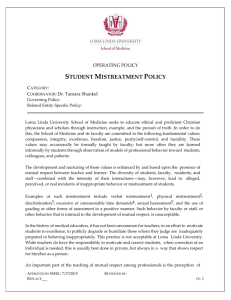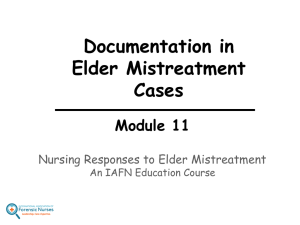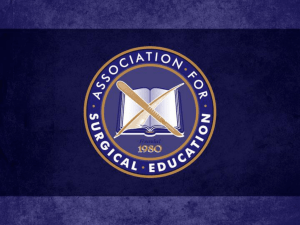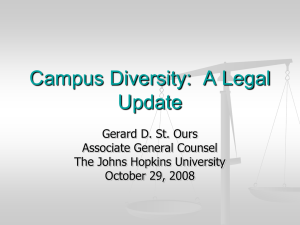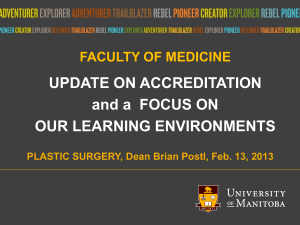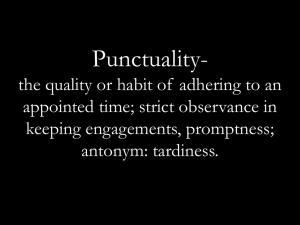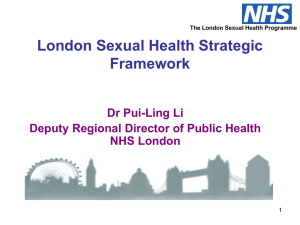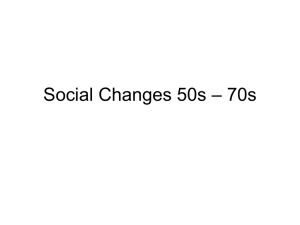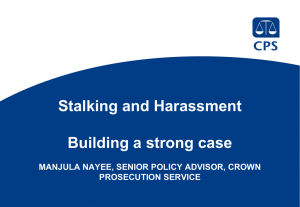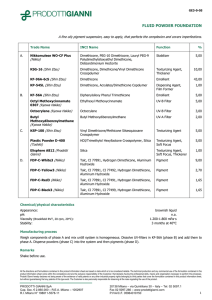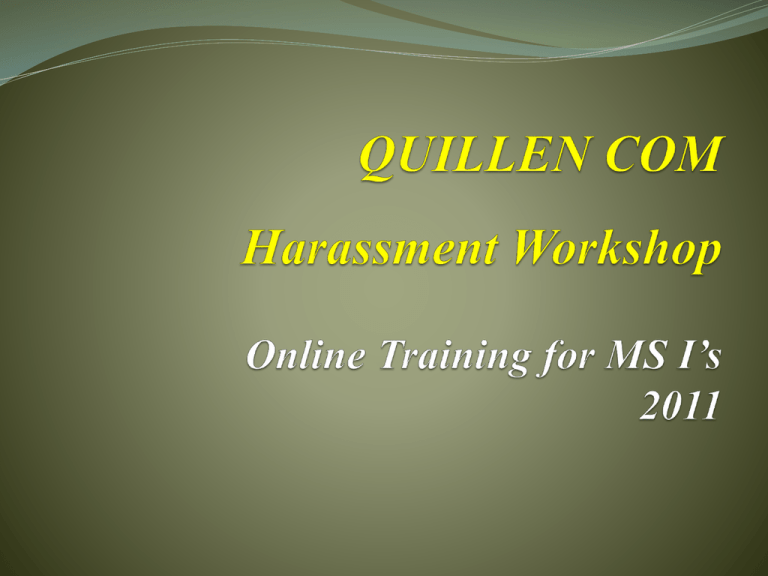
ETSU Harassment/Mistreatment
Online Training
First complete the online training required of everyone at
East Tennessee State University (ETSU)
1st year Med Students will take the “first time user”
version (you will do a “refresher” version as you begin
your clinical clerkships)
After you complete this training, continue with this
PowerPoint presentation with additional information
related to harassment and medical student mistreatment
specific to Quillen College of Medicine
ETSU Harassment/Mistreatment
Online Training – Instructions:
Preventing Sexual Harassment:
http://training.newmedialearning.com/psh/easttennsu
Click on "First Time User" and take the "Student" version.
In order to have your training logged appropriately, at the end
of the Mastery Test, choose "Health Affairs" for Division and
"Medicine, Quillen College of" for Department.
You do not need to send your certificate of completion to
anyone, but you should make a copy for your own personal
files of this and any other training you complete throughout
your professional career.
The company that runs this program for ETSU will notify
the Office of Equity and Diversity of your successful
completion.
Have you completed the ETSU
training?
This module builds on the main ETSU training.
If you have not yet completed the ETSU training (link in
previous slide), please do so before continuing with this
powerpoint.
Subtitle from a Resident Physician
for the QCOM-specific training::
“This is NOT Grey’s Anatomy!”
Remember…
The keyword in mistreatment and
harassment is “Unwelcome”
Review: Harassment Policies and
Federal Law
Prohibit discrimination on the basis of race, color, religion,
sex, or national origin
ETSU also prohibits discrimination on the basis of sexual
orientation
Sexual harassment is a special form of sex discrimination
which also violates our medical student mistreatment
policy
Review: Sexual Harassment
Legal Definition
Unwelcome sexual advances, requests for sexual favors, and
other verbal or physical contact of a sexual nature
constitute sexual harassment when:
- It is a condition of academic standing (explicit or implicit)
- Academic decisions are based on submission to or rejection of
the conduct
- It unreasonably interferes with your academic performance or
creates an intimidating hostile, or offensive academic
environment
Review: Equal Employment
Opportunities Commission (EEOC)
“Victim” and “Harasser”
- Both may be either a man or a woman
- Both may be of the same sex
- “Victim” may be anyone affected, not just the “target”
- The “harasser” may be the “victim’s” supervisor, a co-worker, a
resident, a fellow student, or an agent of the employer (clinical
instructor, etc.)
Review: Two Forms of Sexual
Harassment
Quid Pro Quo: power relationship; demands in
exchange for employment or academic benefits; easily
identified
Hostile Environment: harasser as a “polluter,”
atmosphere that interferes with ability to work or
learn; abusive, offensive or hostile behavior; must be
“unwelcome” and based on sex or gender; behavior
must be repeated
Consensual Relationships
A particularly important issue at the College of Medicine!
Does the law recognize them? NO!
So there are a number of potential liabilities:
If supervisor wants to sever relationship and the supervisee
does not – the supervisee could claim sexual harassment
because he or she felt “forced” into a relationship
If supervisee wants to sever relationship and supervisor does
not, supervisor could hold the threat of poor grade or
evaluation over the supervisee. Good evaluations critical in
getting good residency programs, fellowships, practice settings
Consensual Relationships, cont’d.
Third party complaints of “hostile environment”
If there is a consensual relationship that continues to work
well for the two romantically involved, what’s wrong with
that?
Others may feel they are being left out of training,
research, and other opportunities because of the
relationship, and may file a complaint of “hostile
environment” sexual harassment. All students should be
taught and treated equally at the college of medicine!
Consensual Relationships, cont’d.
What does this mean to me?
Less of an issue in the M1 and M2 years (still may occur)
Medical training involves a number of intelligent, highly-
trained individuals who work closely together in intense
settings. Good opportunities to learn about the character of
those you meet. Good relationships may develop from this
environment.
HOWEVER, please avoid developing a romantic
relationship with anyone who supervises you. This is for
your benefit as well as the benefit of any supervisor you
might consider becoming involved with.
Consensual Relationships, cont’d.
More of an issue in M3 & M4 clinical years when you are
taught more by adjunct faculty who have not been through
ETSU training, and resident physicians who are
inexperienced and do not yet understand the potential
consequences to their careers.
If you find yourself becoming romantically involved (or
wishing to) with someone who supervises you, please let
me or someone in Academic Affairs know so we can work
on moving one or the other so you are no longer
supervised by this individual!
Special Issues for Residents*
*Most complaints from medical students are about mistreatment/ harassment
by residents. This is part of what I tell them:
Medical Students – Best not talk about personal issues, yours or theirs; don’t ask
for a date; don’t call at home (except for medical emergency related to the
service)
Patients – Unethical to date a patient; best not to become involved with family
members
Staff – More complex – Though not strictly unethical, best not to be involved
with someone you work with directly
- Please review the additional information on handout that goes with this
PowerPoint -
How to Avoid Accusations of Harassment
This is what we tell those who supervise you, and
what you should keep in mind for the near future,
when you will be senior students supervising M1’s,
M2’s and M3’s!
Always behave in a professional manner in the
professional setting
Most people are not interested in legal action or even
in filing a formal complaint
Most people simply want the offensive behavior to
stop!
James H. Quillen College of Medicine
East Tennessee State University
Review
Mistreatment Prevention
Three Main Components
College of Medicine standards of behavior and definition
of mistreatment
Plan for ongoing education
Description of the process for responding to allegations of
mistreatment
Mistreatment Prevention
Definition
Improper use or handling of an individual(s) which
may:
- cause the subject to become more cynical about the
medical profession
- interfere with the learning process
- cause talented individuals to leave medical training
- promote an atmosphere in which abuse is accepted and
perpetuated in medical training
Mistreatment Prevention
Some Examples of Mistreatment
Public belittling or humiliation: This does not refer to
when someone asks you a question, you can’t remember
and you feel humiliated. This refers to someone saying
something like, “you are the dumbest student who ever
went to QCOM,” where they intend to belittle you.
Threats of physical harm; disregard for student safety:
Any threats of physical harm, including blocking your
path of exit from a room, or disregarding your safety in
the clinical setting – ex. Telling you not to bother with
protective clothing upon entering a posted room of a
patient with an infectious disease.
Mistreatment Prevention
Examples of Mistreatment, cont’d
Requiring performance of personal services for grades/evaluation:
You should receive grades, evaluations or other assignments based
upon your academic performance, not based on anything outside the
educational setting. Ex., A resident tells his group of students they
can’t go home until someone agrees to go feed his dogs and take
them for a walk. If you happen to know this resident has dogs who
need to be fed and walked and you choose to volunteer of your own
free will, that is fine – it is your choice; however, he/she cannot base
any aspect of your training, including when you can go home, on
whether you do this or not!
Threatening a lower grade or evaluation for reasons other than
course/clinical performance: Self-explanatory
Mistreatment Prevention
Examples of Mistreatment, cont’d.
Discrimination on the basis of race, gender (includes
sexual harassment), sexual orientation, religion, ethnic
background, age, or physical disability: Considered
Medical Student Mistreatment, although handled under
ETSU discrimination policies
Intentional neglect or lack of communication: There
are going to be folks you get along with better than
others, but they are hired or assigned to teach you
equally. If you feel your questions are ignored, or
other students are getting more assistance or more
procedures (on a clinical service) than you are, this
may be an issue.
Mistreatment Prevention
Examples of Mistreatment, cont’d
Taking credit for another individual’s work: Usually with
reference to research, and also more likely in the M3 & M4
year, but some students do research between their M1 & M2
years. If you work on a project and contribute significantly to a
publication (either in lab research, literature research or
writing), the final version may not be completed until after you
have left that service or rotation, but your name should appear
on the final publication to acknowledge your work.
Any other behavior contrary to the spirit of learning and/or
which violates the trust between the teacher and learner: You
are all very intelligent or you would not be here! Trust your
instincts. If something does not seem right, check it out with
the Grievance Officer or another trusted individual in the
QCOM administration.
Mistreatment Prevention
Process for Responding to Allegations
Informal resolution by parties involved
Mediation role of Grievance Officer
Conflict Resolution Council
Working Subcouncil
Mistreatment Prevention
Protections
Retaliation: Regarded as a form of mistreatment and
not tolerated
Malicious accusations: Disciplinary action will be
taken for any student making intentionally dishonest
allegations
Professional reputations: Reasonable steps taken to
restore any professional reputation tarnished through
any aspect of this process
Complete Policies
The complete ETSU Harassment Policies, Quillen College
of Medicine Sexual Harassment Policy and Medical
Student Mistreatment Policy are all available online for
your review:
http://www.etsu.edu/com/acadaffairs/studentinfo/documen
ts/Student_Handbook_2010-2011.pdf - pp. 41-46
ETSU Affirmative Action Complaints:
http://www.etsu.edu/humanres/relations/ppp40.aspx
How to get help:
Contact person for the College of Medicine: Dr. Theresa
Lura, Asst. Dean of Women in Medicine: 439-8849
Affirmative Action Officer for ETSU: Ms. Mary Jordan,
439-4211; VP for Health Affairs: 439-4811
ETSU VP for Student Affairs: 439-4210; Dean of the
Graduate School: 439-4221; University Counsel: Atty. Ed
Kelly 439-8550
The Reality:
Mistreatment and Harassment are highly unlikely to
happen to you at Quillen College of Medicine…
…But a few incidents occur every year, and you know
who to call if it does
CONGRATULATIONS – and Welcome to Medical School!

